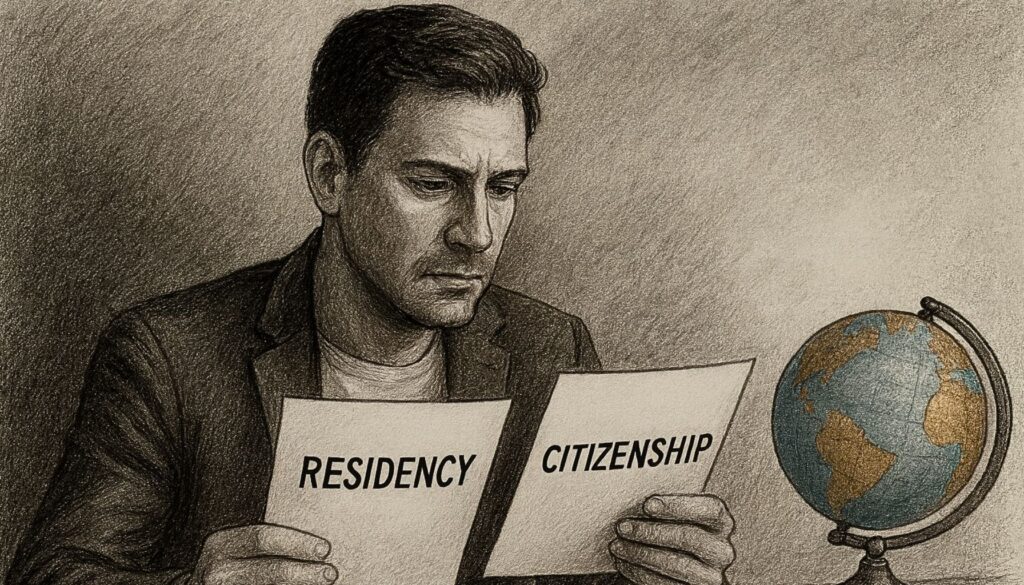Being a digital nomad in 2025 is no longer just about living a free and connected lifestyle. It also means facing a system that, while it needs capital and talent, builds bureaucratic walls to push out those who contribute the most.
Europe is the clearest example: it claims to attract global professionals, yet at the same time passes laws that make it impossible to secure a roof over your head. Under the excuse of “defending the right to housing,” Europe has erected barriers against flexible rentals, attacked short-term rental platforms, and turned the life of a nomad into a minefield of regulations.
The result is a grotesque contradiction: visas that promise freedom… paired with rules that leave you homeless. Because you may have all your paperwork in order, but if no landlord is willing to rent to you, your digital residence becomes useless.
In this blog, we’ll show you why European bureaucracy has turned digital nomads into collateral damage of an absurd war against tourism, what the risks of being a digital nomad in Europe are, how being a digital nomad boosts the local economy, and—most importantly—the best countries for being a digital nomad today, where your talent and money are truly welcome.

Indice del artículo
Bureaucracy and obstacles to being a digital nomad: when Europe gives you papers but no roof
Europe has declared war on flexible housing, directly affecting digital nomads. Across the continent, several capitals have turned the simple act of renting into a maze of regulations.
Spain: Organic Law 1/2025
In Spain, bureaucracy has reached absurd levels. Organic Law 1/2025 forces a property owner to obtain permission from their neighbors before renting to tourists. The rule doesn’t start from trust, but from an automatic “no,” unless the community votes otherwise.
In addition, all accommodations must be registered on platforms and face fines of up to €600,000. And as if that weren’t enough, Barcelona has decided to eliminate all tourist apartment licenses by 2028. For anyone aiming at being a digital nomad in Spain, the promise of freedom turns into a dead end.
Portugal: the “Mais Habitação” plan
Portugal took a different path, but one just as restrictive. Its “Mais Habitação” plan imposes a 15% tax on short-term rental income in hot zones and offers up to a 100% tax exemption for those who withdraw their properties from the short-term market.
The message is clear: renting to nomads and travelers is punished, giving them up is rewarded. In this way, Lisbon and Porto’s supposed openness to digital nomads is reduced to mere marketing.
France: the 2024 anti-Airbnb law
France completed the circle with its 2024 anti-Airbnb law: the end of tax benefits, a 90-day annual limit on rentals, mandatory registration, and even neighbors with veto power. In practice, this means that a digital nomad in Paris has the same housing options as a weekend tourist: almost none.
With all this, Europe opens the door to the next risk: even with papers in order, you may still be treated as an intruder and forced to leave.

Risks of being a digital nomad in Europe: promises of welcome that end in expulsion
The greatest danger of being a digital nomad in Europe is not obtaining the visa, but what happens afterward. The big print promises mobility and legal residence, but the fine print tells another story: ending up expelled by the very system that claimed to welcome you.
Housing insecurity and lack of guarantees
One of the risks of being a digital nomad in Europe is the insecurity around renting or investing. Even with all your papers in order, a digital nomad may find themselves without a valid rental contract or without legal guarantees when investing in housing. In countries where uncontrolled squatting and tenant-friendly laws prevail, what should be stability turns into permanent uncertainty.
The erosion of trust in Europe
When a continent changes its rules every two years, the risk is unpredictability. Where today you are welcomed, tomorrow you may be the enemy. This erosion of trust makes many waste time, money, and opportunities in countries that never truly considered them real allies.
These risks prove that Europe is not stable ground for building a future. At the same time, however, they show the opposite: that there are clear advantages to being a digital nomad when you choose destinations that genuinely value your presence.

How being a digital nomad boosts the local economy
Talking about being a digital nomad is not about backpacks or selfies. It’s about a global community that brings talent, capital, and stability wherever it settles. Data clearly shows how being a digital nomad boosts the local economy: it revitalizes neighborhoods, keeps cafés, coworking spaces, and small businesses alive—all of them dependent on the constant flow of mobile professionals. And yet, Europe prefers to ignore this impact.
The real profile of the digital nomad in 2025
Today, there are between 40 and 80 million digital nomads worldwide. Most are between 30 and 39 years old, over 90% hold higher education degrees, and many combine freelancing with entrepreneurial projects. We’re not talking about improvised travelers—we’re talking about qualified professionals with purchasing power and a long-term vision.
A global economic engine
Digital nomads move over $800 billion a year. The average income is around $124,000, with a median of $85,000. The most relevant factor is how they spend: each nomad allocates between $800 and $1,500 monthly in the country where they stay, from rent to leisure. On average, 35% of their income flows directly into the local economy.
That is the true impact of how being a digital nomad boosts the local economy: a constant stream of fresh capital and stable consumption that sustains communities—not just individuals.
The example of Barbados
Barbados understood this phenomenon quickly. With a simple nomad visa, in just ten months it welcomed 2,500 professionals. The result? $100 million injected into the local economy. No factories, no multinationals. Just online talent, rentals, and local consumption. A clear example of how a small country can multiply its growth by opening its doors to digital nomads.
The future of being a digital nomad: between control and opportunity
More control and global taxation
The digital nomad figure is no longer an improvised adventure—it’s becoming a conscious strategy, especially in a world moving toward more regulation, digital taxation, and institutional control.
The OECD already warns that Digital Nomad Visa programs may lead to serious tax implications, such as recognizing tax residency after 183 days or even permanent establishment risks that force companies to pay taxes in multiple jurisdictions. At the same time, the international agenda pushes forward agreements like the G20/OECD global minimum corporate tax, aiming to redefine how digital activity is taxed across borders.
The opportunity to get ahead
But it’s not all restriction. As rules tighten, competition between countries to attract remote talent also grows. Flexible visas, clear fiscal frameworks, and accessible digital environments are becoming strategic advantages for those who plan ahead.

Best countries for being a digital nomad today: where your talent is truly welcome
There are destinations that understand the value of those who travel with capital, talent, and stability. These are some of the best countries for being a digital nomad today, where doors are open and investment is still welcome.
Paraguay: profitability and light regulation
In Asunción, an average rental property can generate around $9,000 annually with 63% occupancy. Gross yields range between 7% and 12% per year, thanks to simple taxation and light regulation. For those seeking a starting point in Latin America, Paraguay combines low cost of living, sustained growth, and a legal framework that doesn’t suffocate digital nomads.
El Salvador: security and tax incentives
Property sales have grown more than 70% since 2020, driven by a safer environment and attractive tax measures. Areas like El Zonte, El Tunco, and La Libertad have become hubs of foreign investment. For the digital nomad, El Salvador represents a place where bureaucracy does not block the opportunity to live, work, and invest.
Georgia: low taxes and high demand
In Tbilisi, gross rental yields range between 7% and 9%, reaching up to 10% in emerging neighborhoods. With flexible visas and low taxes, Georgia has positioned itself as a growing destination for freelancers, students, and online entrepreneurs. Here, digital nomads find a young, dynamic ecosystem with rising demand for flexible housing.
These examples show that the best countries for being a digital nomad today are not those delivering speeches in Brussels, but those that truly understand the opportunity of attracting talent. The choice is no longer between traveling or staying put—it’s between getting trapped by European bureaucracy or building your strategy in destinations where you are genuinely welcome.
Conclusion: being a digital nomad is strategy, not improvisation
Being a digital nomad in 2025 is not just about choosing a lifestyle. It’s about understanding that your profile represents capital, consumption, and talent that any country should want to attract.
The true freedom of a digital nomad is not about moving aimlessly, but about designing a strategy that combines mobility, smart taxation, and real stability. And that starts by choosing destinations where your money and your talent are seen as opportunities—not as threats.



